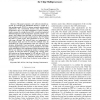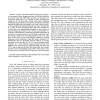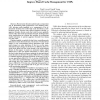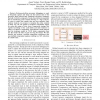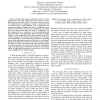107
click to vote
ISCA
2009
IEEE
15 years 8 months ago
2009
IEEE
Many multi-core processors employ a large last-level cache (LLC) shared among the multiple cores. Past research has demonstrated that sharing-oblivious cache management policies (...
121
click to vote
ISCA
2009
IEEE
15 years 8 months ago
2009
IEEE
Caching techniques have been an efficient mechanism for mitigating the effects of the processor-memory speed gap. Traditional multi-level SRAM-based cache hierarchies, especially...
125
click to vote
IEEEPACT
2009
IEEE
15 years 8 months ago
2009
IEEE
Abstract—This paper proposes a new software-oriented approach for managing the distributed shared L2 caches of a chip multiprocessor (CMP) for latency-oriented multithreaded appl...
116
click to vote
IEEEPACT
2009
IEEE
2009
IEEE
Soft-OLP: Improving Hardware Cache Performance through Software-Controlled Object-Level Partitioning
15 years 8 months ago
—Performance degradation of memory-intensive programs caused by the LRU policy’s inability to handle weaklocality data accesses in the last level cache is increasingly serious ...
102
click to vote
IEEEPACT
2009
IEEE
15 years 8 months ago
2009
IEEE
Abstract—In order to harness the full compute power of manycore processors, future designs must focus on effective utilization of on-chip cache and bandwidth resources. In this p...
126
click to vote
IEEEPACT
2009
IEEE
15 years 8 months ago
2009
IEEE
—Shared cache allocation policies play an important role in determining CMP performance. The simplest policy, LRU, allocates cache implicitly as a consequence of its replacement ...
121
Voted
ICPP
2009
IEEE
15 years 8 months ago
2009
IEEE
Abstract—As Chip-Multiprocessor systems (CMP) have become the predominant topology for leading microprocessors, critical components of the system are now integrated on a single c...
128
click to vote
SEUS
2009
IEEE
15 years 8 months ago
2009
IEEE
Future embedded systems are expected to use chip-multiprocessors to provide the execution power for increasingly demanding applications. Multiprocessors increase the pressure on th...
111
click to vote
DATE
2009
IEEE
15 years 9 months ago
2009
IEEE
—During post-silicon processor debugging, we need to frequently capture and dump out the internal state of the processor. Since internal state constitutes all memory elements, th...
DATE
2009
IEEE
15 years 9 months ago
2009
IEEE
Abstract—Caches often employ write-back instead of writethrough, since write-back avoids unnecessary transfers for multiple writes to the same block. For several reasons, however...

